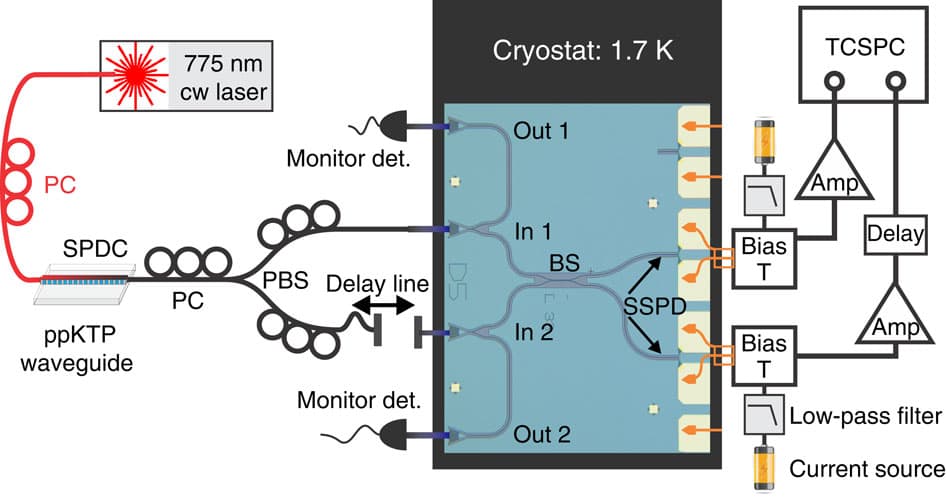Engineers at Yale develop quantum chip, Next step - a programmable quantum processor
In what can only be termed as a big step in the manufacture of practical quantum circuits, engineers from the Yale School of Engineering and Applied Science have created a silicon chip embedded with all the required components for a quantum processor.
Quantum computers are often portrayed as the next step in computer technology, and with good reason. Theoretically, a quantum computer would be thousands of times faster than today’s fastest supercomputers. They could also help in the creation of a practically capable AI. Quantum computers would drastically improve humanity’s data processing capabilities, and that is why researchers have been working for years towards their realization.

A quantum processor would mainly require two things: quantum interference, and single-photon detectors. Quantum interference is the process by which a photon produces interference with it’s own energy state, and the detectors are equipment used to measure this interference. All the current photon detector setups take up a lot of space; roughly the equivalent of a standard room. And that is just for the measurement of a single photon; to measure the state of another photon, there needs to be another separate room filled with the same type of equipment.
The complexity of measuring a quantum system arises from the fact that they are extremely sensitive to the external environment. Even a single system demands careful control, and that is why multiple quantum systems require separate control environments.
The chip created by the engineers at Yale solves these problems by integrating the functions of the bulky controlling equipment into its tiny frame. The chip contains a nano-photonic waveguide, used to guide light on the chip, and a directional coupler, which can split a beam of light into two separate beams or combine two separate beams into one to give a single output. These two components do the job that previously required numerous expensive equipments.
The chip can also integrate multiple quantum systems into its framework by adding additional circuits using nano-fabrication.
The processes used for the manufacture of the chip can be easily and inexpensively duplicated any number of times. The engineers believe that this will do to current quantum measurement systems what the IC chip did to the first computers; cutting down the size to a fraction of the original, with an exponential increase in processing power. This silicon chip could very well lead to manufacturing of a programmable quantum processor, and eventually, the much awaited quantum computer.
Source: #-Link-Snipped-# | <a href="https://seas.yale.edu/news-events/news/quantum-technology-chip" target="_blank" rel="nofollow noopener noreferrer">Quantum Technology On A Chip | Yale School of Engineering & Applied Science</a>
Quantum computers are often portrayed as the next step in computer technology, and with good reason. Theoretically, a quantum computer would be thousands of times faster than today’s fastest supercomputers. They could also help in the creation of a practically capable AI. Quantum computers would drastically improve humanity’s data processing capabilities, and that is why researchers have been working for years towards their realization.
A quantum processor would mainly require two things: quantum interference, and single-photon detectors. Quantum interference is the process by which a photon produces interference with it’s own energy state, and the detectors are equipment used to measure this interference. All the current photon detector setups take up a lot of space; roughly the equivalent of a standard room. And that is just for the measurement of a single photon; to measure the state of another photon, there needs to be another separate room filled with the same type of equipment.
The complexity of measuring a quantum system arises from the fact that they are extremely sensitive to the external environment. Even a single system demands careful control, and that is why multiple quantum systems require separate control environments.
The chip created by the engineers at Yale solves these problems by integrating the functions of the bulky controlling equipment into its tiny frame. The chip contains a nano-photonic waveguide, used to guide light on the chip, and a directional coupler, which can split a beam of light into two separate beams or combine two separate beams into one to give a single output. These two components do the job that previously required numerous expensive equipments.
The chip can also integrate multiple quantum systems into its framework by adding additional circuits using nano-fabrication.
The processes used for the manufacture of the chip can be easily and inexpensively duplicated any number of times. The engineers believe that this will do to current quantum measurement systems what the IC chip did to the first computers; cutting down the size to a fraction of the original, with an exponential increase in processing power. This silicon chip could very well lead to manufacturing of a programmable quantum processor, and eventually, the much awaited quantum computer.
Source: #-Link-Snipped-# | <a href="https://seas.yale.edu/news-events/news/quantum-technology-chip" target="_blank" rel="nofollow noopener noreferrer">Quantum Technology On A Chip | Yale School of Engineering & Applied Science</a>
0
